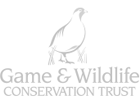Blogs
-

in:
GWCT News Blog
under:
Policy
, Pheasants & Releasing
Defra informed stakeholders on 21st March that GL43 will be published in the next couple of weeks. However, GL45 will not be released this year, meaning that individual licences must be sought for those wanting to release gamebirds on SPAs.
-

in:
GWCT News Blog
under:
Policy
For any fire to start and spread it needs fuel, oxygen and an ignition source. But when it comes to wildfires at a landscape scale there are additional factors such as the fire environment (weather, topography and fuel) and the fire regime (landform, climate and vegetation).
-

in:
GWCT News Blog
under:
Policy
Our soils are at risk, and nitrous oxide emissions play a big role in the environmental challenge. Discover how innovative practices can help mitigate this silent threat.
-

in:
GWCT News Blog
under:
Farming
, Policy
Discover how the innovative "3Rs" approach can revolutionise conservation practices and learn why resilience, regenerative farming, and rewilding are key to sustainable wildlife management
-

in:
GWCT News Blog
under:
Policy
, Farming
Wild bird populations continue to decline as demonstrated by Government statistics released on 12th November. We have used the graphs for breeding farmland, woodland, water and wetland and upland birds generated by these statistics many times to emphasise the need for a change in approach to conservation.
-

in:
GWCT News Blog
under:
Policy
GWCT Senior Advisor Mike Swan discusses the reintroduction of wolves and other species in Europe and the UK, highlighting challenges posed by strict protection statuses.
-

in:
GWCT News Blog
under:
Policy
The UK is considered nature-depleted by the Biodiversity Intactness Index (BII), but alternative metrics show better biodiversity rankings. Addressing the biodiversity crisis requires both conservation efforts and a careful approache.
-

in:
GWCT News Blog
under:
Policy
The analysis we did of grouse moor management’s contribution to government policy identified 12 public goods and services from food production to recreation and biodiversity.
-

in:
GWCT News Blog
under:
Policy
, Farming
The year has been dominated by two policy eras – the last weeks of the Conservative government and the first few weeks of the new Labour one. But perhaps surprisingly the key messages during these eras have been broadly the same, focussing on water quality, ELMS and nature recovery.
-

Get the Latest News & Advice
Join over 100,000 subscribers and stay updated on our latest advice, research, news and offers.
*You may change your mind any time. For more information, see our Privacy Policy.